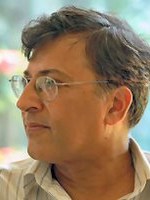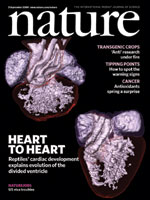Adil Najam

 Dr. Pervez Hoodbhoy, one of Pakistan’s pre-eminent intellectuals and someone who I and ATP holds in the highest esteem (here and here), has written a letter to the editors of Nature in response to the recent article (of which I was a co-author) on Pakistan’s higher education reform experiment.
Dr. Pervez Hoodbhoy, one of Pakistan’s pre-eminent intellectuals and someone who I and ATP holds in the highest esteem (here and here), has written a letter to the editors of Nature in response to the recent article (of which I was a co-author) on Pakistan’s higher education reform experiment.
I just wrote to Pervez requesting that in the interest of greater discussion on this important issue, he allow us to reproduce the letter here at ATP. He has graciously agreed.
We reproduce his letter, in full, here:
“Pakistan’s Reform Experiment” (Nature, V461, page 38, 3 September 2009) gives the impression of providing a factual balance sheet of Pakistan’s higher education under General Pervez Musharraf’s former government. Unfortunately, several critical omissions indicate a partisan bias.
Mention of the billions wasted on mindless prestige mega-projects is noticeably absent. Example: nine new universities were hastily conceived and partially constructed, but abandoned and finally scrapped after it became obvious that it was impossible to provide them with the most crucial ingredient – trained faculty. Similarly, fantastically expensive scientific equipment, imported with funds from the Higher Education Commission, remain hopelessly under-utilized many years later. They litter the country’s length and breadth. For instance, my university has been forced to house a “souped-up” Van de Graaf accelerator facility, purchased in 2005 with HEC funds. A research purpose is still being sought in 2009.
The authors conveniently choose not to mention that the 400% claimed increase in the number of publications was largely a consequence of giving huge payments to professors for publishing in international journals, irrespective of actual substance and quality. Not surprisingly these cash-per-paper injections had the effect of producing a plagiarism pandemic, one that is still out of control. In a country where academic ethics are poor and about a third of all students cheat in examinations, penalties for plagiarism by teachers and researchers are virtually non-existent.
Citing Thomson Scientific, the authors claim a large rise in the “relative impact” in some disciplines, based upon citation levels of papers published between 2003 and 2007. But did the authors try to eliminate self-citations (a deliberate ploy) from this count? If they had – as I did using an available option in the Thomson Scientific package – they might actually have found the opposite result.
While the authors laud the increase in the salaries of university professors by the HEC, they pay no attention to the disparities thus created. The salary of a full professor (after the raises) can be 20-30 times that of an average Pakistani school teacher. Money raining down from the skies has created a new dynamic as well. Naked greed is now destroying the moral fibre of Pakistan’s academia. Professors across the country are clamoring to lift even minimal requirements that could assure quality education.
This is happening in three critical ways. First, given the large prospective salary raises, professors are bent upon removing all barriers for their promotions by pressuring their university’s administration as well as the HEC. Second, they want to be able to take on more PhD students, whether these students have the requisite academic capacity or not. Having more students translates into proportionately more money in each professor’s pocket. Third, a majority wants the elimination of all international testing – such as the Graduate Record Examination administered from Princeton. These had been used as a metric for gauging student performance within the Pakistani system.
Pakistan’s failed experiment provides a counter example to the conventional wisdom that money is the most important element. Instead, an enormous cash infusion, used badly, has served to amplify problems rather than improve teaching and research quality. There is much that other developing countries can learn from our experience – and it is opposite to what the authors want us to conclude.
Dr. Hoodbhoy is a leading voice on science and education policy and has been the most prominent critic of the Pakistan Higher Education Commission (HEC) over the years. Personally, I can think of few who have been more committed to Pakistan’s higher education than him. For all of these reasons, I take his opinions very seriously, even when my own assessment might end up to be different from his, as it has been in this case
Since we have made our case in print and he has too, I will not go into rebuttals. Nor is that possible since the co-authors have not yet had a time to carefully and and collectively respond to this (the group was large, spread out across the globe, and deliberately structured to be diverse). But speaking strictly for myself, there are a number of points I would not disagree with (For example, in our article we have also been critical – although maybe not as much as Pervez would have liked us to be – of the domestic PhD program and the consequences of the incentives given). But that would not change my overall assessment. Our goal, as we saw it, was to look at the entirety of Pakistan’s higher education reform effort and, as honestly and as best as we could, to arrive at a collective assessment of the total impact (the good as well as the bad) in the very limited space we had.
Where our assessment does differ from Dr. Hoodbhoy’s, I think, is that while he clearly believes the Pakistan reform experiment to have “failed,” we believe that it is “too early to judge the outcome” but that some aspects of the experiment have and will give much better results than others. Where we do not differ is that like him (and I take the liberty of quoting from his email to me) we too “feel rather strongly on what’s needed for fixing our universities.” Our assessments may differ, but our goal is the same.
Importantly, we also agree that (and, again, I quote from his email), “its important to debate such issues.” It is in that spirit that I had asked Pervez to let us share his response here. A focus on how best to improve higher education in Pakistan is the core of all of our concerns, and was also the core of our recommendation in the paper “for an independent peer review of the HEC’s performance.” I hope that our readers can also help all of us focus much more on this very question which motivates all of us, Dr. Hoodbhoy, myself, and my co-authors: what is it that we have learnt so far and what is it that we should do in the future to strengthen and improve higher education in Pakistan.



















































The problems of higher education in Pakistan are very serious ones. We really need to get beyond personal vendettas and look seriously at the issues and what we can do about them. Unfortunately, Pervez Hoodbhoy and Atta Rahman have both made it personal. Please, lets get over it and to real issues.
Its not the issue of left right in the department, but issue of imposing dictatorial decisions on one teacher in the department and by that person who pretend to be advocate of human rights and democracy..it is quite strange that on one side they talk about human rights and democracy, rule of law and on the other hand they do not abide any rule in running the affairs of the deptt. If syndicate have approved the appointment, then according to the constitution of the university and rules and regulations, the department head is bound to accept it as a democrat and activist of human rights. The civil society is defined as that where one should do the job which is assigned to him or her and the current job of a teacher in QAU is to first serve the University and its students and then there is no objection in extra curricular activism and we appreciate his efforts as advocate of reforms in higher education. We cannot judge the sincerity of his efforts, but at least he should take care of his immediate people in the department who have been serving there for the last ten to fifteen years as teachers. Endless debate….
“All I can ask him is to disclose to general public the number of PhD theses and research articles published in academic journals to his credit during the past 10 years. I also request him to disclose to general public the data source for his magic number of 80% of the university teachers who do not know the art of teaching.”
You are being rather crude about this affair. When the whole system is going down the drain then it’s important to fix the bigger picture and the system as a whole rather than concentrating on a few PhD students. Obviously Dr Hoodbhoy is able to see the bigger picture and you are not.
Problem of Pakistani education is not that Dr Hoodbhoy did not produce a few more PhDs, but the overwhelming state of senselessness…which needs to be sorted first and foremost.
Obviously when one puts his/her efforts into fixing system they need to give some time to it. When Asma Jahangheer works for human rights it’s at the expense of her time as a lawyer in court. Same with any number of other people who participate in struggle for democracy, in opposition to dictatorship, for fixing the education system, working against extremism and so on. The issue is what is more important at this time; fixing the system as a whole or the nitty gritty.
I have also not understood your comment about giving powers to departments to select faculty, as department heads can be unfair to faculty. If you can find out when a department head is unfair to its staff then surely you can also take action against such department head? So again it feels that it’s not a genuine excuse but rather an attempt to undermine Dr Hoodbhoy as a department head. Dr Hoodbhoy’s first and foremost job as department head is to create the right vision and environment for the department which includes selecting the right faculty and you yourself have admitted to putting obstacles in his path.
QAU is not a large university and as an old Alumni of QAU I know that almost everyone knows everyone else and almost everyone who cares to know knows everything that goes on in university. So if a department head is unfair to anyone that would be the talk of the university and by no means hidden. So my advice is to give the department heads their due respect and not be a total dictator at the top. Of course all dictators claim they are the only honest ones and hence can not give authority to any one else.
As someone who did his final project in Solid State lab in Physics Department I am also aware of the decades old rivalry between left and right that goes on in that department. Some of the bickering we hear is also born out of this conflict.